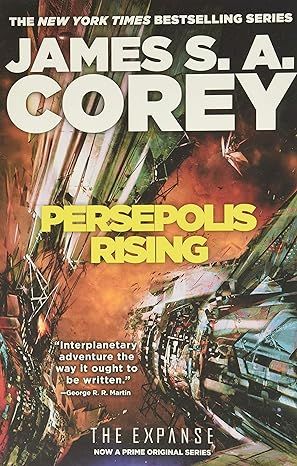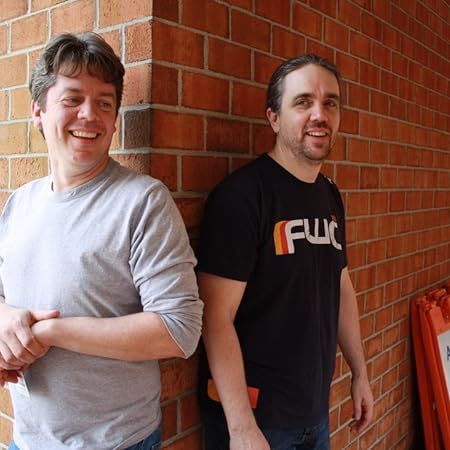Persepolis Rising (The Expanse, 7)
4.6
-
25,957 ratings
The seventh book in the NYT bestselling Expanse series, Persepolis Rising finds an old enemy returning home with more power and technology than anyone thought possible, and the crew of the aging gunship Rocinante tries to rally forces against the new invasion. Now a Prime Original series.
HUGO AWARD WINNER FOR BEST SERIES
An old enemy returns.
In the thousand-sun network of humanity's expansion, new colony worlds are struggling to find their way. Every new planet lives on a knife edge between collapse and wonder, and the crew of the aging gunship Rocinante have their hands more than full keeping the fragile peace.
In the vast space between Earth and Jupiter, the inner planets and belt have formed a tentative and uncertain alliance still haunted by a history of wars and prejudices. On the lost colony world of Laconia, a hidden enemy has a new vision for all of humanity and the power to enforce it.
New technologies clash with old as the history of human conflict returns to its ancient patterns of war and subjugation. But human nature is not the only enemy, and the forces being unleashed have their own price. A price that will change the shape of humanity -- and of the Rocinante -- unexpectedly and forever. . .
The Expanse
- Leviathan Wakes
- Caliban's War
- Abaddon's Gate
- Cibola Burn
- Nemesis Games
- Babylon's Ashes
- Persepolis Rising
- Tiamat's Wrath
- Leviathan Falls
Memory's Legion
The Expanse Short Fiction
- Drive
- The Butcher of Anderson Station
- Gods of Risk
- The Churn
- The Vital Abyss
- Strange Dogs
- Auberon
- The Sins of Our Fathers
Kindle
$11.99
Available instantly
Audiobook
$0.00
with membership trial
Hardcover
$16.54
Paperback
$12.79
Ships from
Amazon.com
Payment
Secure transaction
ISBN-10
0316332852
ISBN-13
978-0316332859
Print length
592 pages
Language
English
Publisher
Orbit
Publication date
October 08, 2018
Dimensions
6 x 1.63 x 9.25 inches
Item weight
1.3 pounds
Frequently bought together
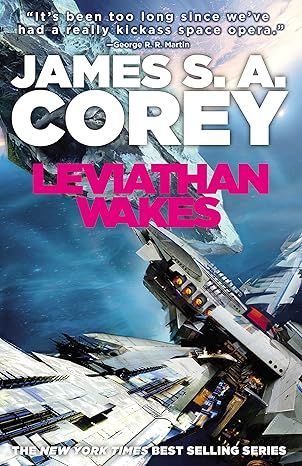
Leviathan Wakes (The Expanse, 1)
4.6
-
52,335
$11.24
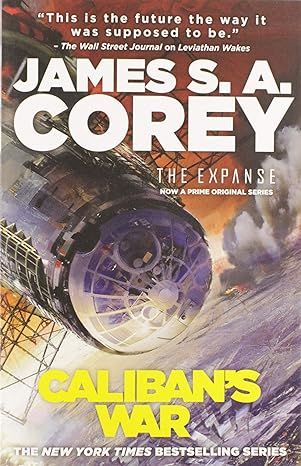
Caliban's War (The Expanse, 2)
4.7
-
37,849
$12.92
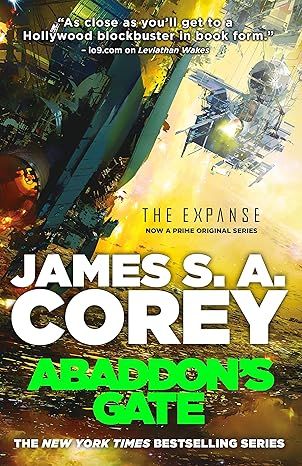
Abaddon's Gate (The Expanse, 3)
4.6
-
34,117
$11.99
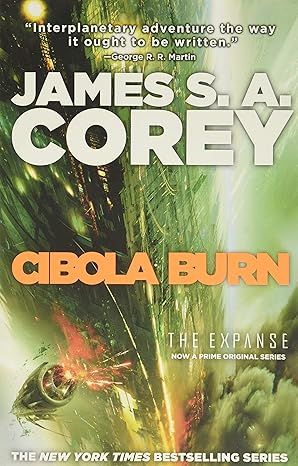
Cibola Burn (The Expanse, 4)
4.6
-
33,345
$11.99
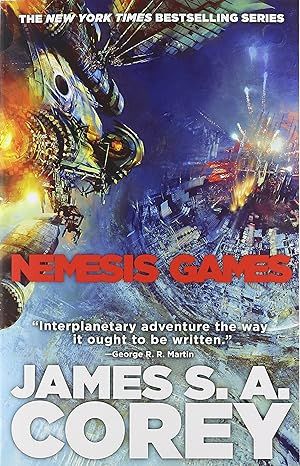
Nemesis Games (The Expanse, 5)
4.6
-
32,883
$11.99
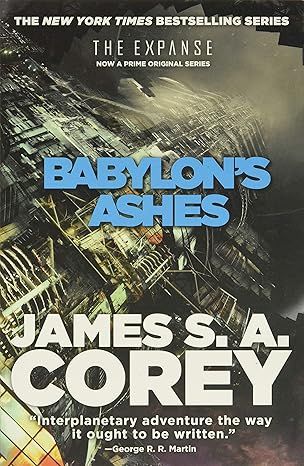
Babylon's Ashes (The Expanse, 6)
4.5
-
29,838
$11.99
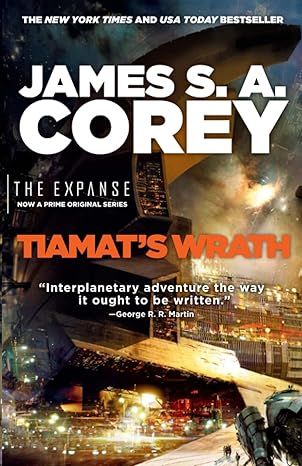
Tiamat's Wrath (The Expanse, 8)
4.8
-
27,918
$11.99
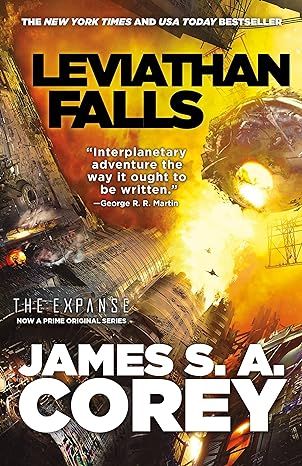
Leviathan Falls (The Expanse, 9)
4.8
-
25,849
$11.99
Popular highlights in this book
It seemed to her that the real sign you were getting old was when you stopped needing to prove you weren’t getting old.
Highlighted by 2,173 Kindle readers
I am a human being. Anything that happens to human beings could happen to me.
Highlighted by 1,858 Kindle readers
I don’t want to bet my life on other people being smart, Holden said.
Highlighted by 1,332 Kindle readers
Product details
ASIN :
B06XKN9G27
File size :
1695 KB
Text-to-speech :
Enabled
Screen reader :
Supported
Enhanced typesetting :
Enabled
X-Ray :
Enabled
Word wise :
Enabled
Award winners:
Editorial reviews
"A standout tale of violence, intrigue, ambition, and hope. ... Corey cranks up the tension relentlessly in this fast-paced story of heroes and rebels fighting for freedom. With enough thrills and intrigue for three Hollywood blockbusters, the novel stands alone nicely, making it easy for new readers as well as diehard series fans to dive right in."―Publishers Weekly on Nemesis Games
"The science fictional equivalent of A Song of Ice and Fire...only with fewer beheadings and way more spaceships."―NPR Books on Cibola Burn
"Combining an exploration of real human frailties with big SF ideas and exciting thriller action, Corey cements the series as must-read space opera."―Library Journal (Starred Review) on Cibola Burn
"The Expanse series is the best space opera series running at full tilt right now, and Cibola Burn continues that streak of excellence."―io9
"Corey's splendid fourth Expanse novel blends adventure with uncommon decency."―Publishers Weekly (Starred Review) on Cibola Burn
"A politically complex and pulse-pounding page-turner.... Corey perfectly balances character development with action... series fans will find this installment the best yet."―Publishers Weekly on Abaddon's Gate
"It's been too long since we've had a really kickass space opera. Leviathan Wakes is interplanetary adventure the way it ought to be written, the kind of SF that made me fall in love with the genre way back when, seasoned with a dollop of horror and a dash of noir. Jimmy Corey writes with the energy of a brash newcomer and the polish of a seasoned pro. So where's the second book?"―George R. R. Martin
"An excellent space operatic debut in the grand tradition of Peter F. Hamilton."―Charles Stross on Leviathan Wakes
"High adventure equaling the best space opera has to offer, cutting-edge technology, and a group of unforgettable characters bring the third installment of Corey's epic space drama (after Caliban's War and Leviathan Wakes) to an action-filled close while leaving room for more stories to unfold. Perhaps one of the best tales the genre has yet to produce, this superb collaboration between fantasy authors Daniel Abraham and Ty Franck should reawaken an interest in old-fashioned storytelling and cinematic pacing. Highly recommended."―Library Journal on Abaddon's Gate
"Literary space opera at its absolute best."―io9 on Abaddon's Gate
"[T]he authors are superb with the exciting bits: Shipboard coups and battles are a thrill to follow."―Washington Post on Abaddon's Gate
"Riveting interplanetary thriller."―Publishers Weekly on Leviathan Wakes
Read more
Sample
Prologue: Cortázar
Almost three decades had passed since Paolo Cortázar and the breakaway fleet had passed through Laconia gate. Time enough to build a little civilization, a city, a culture. Time enough for him to confirm that alien engineers had designed the protomolecule as a bridge builder. They had thrown it into the stars like seeds to hijack whatever organic life it encountered and create ring gates into a pocket universe, a nexus between worlds. Until they died out, the slow zone and its rings had been the hub of an empire that defied human comprehension. And now, it would be again. A little bridge-building mechanism that overcame locality changed everything for all humanity.
Not that Paolo cared about all humanity. For him, the fact of the protomolecule and the technologies it opened was all-encompassing. It not only changed the shape of the universe around him but also altered his personal and professional life. For decades, it had been his only obsession. In the fight that ended their relationship, his most recent boyfriend had accused him of actually loving the protomolecule.
Paolo hadn’t been able to deny it. It had been so long since Paolo felt anything approaching love for another human that he’d lost the context for what did and didn’t qualify. Certainly, studying the protomolecule and all the myriad branches of scientific insight that came from it took most of his time and attention. Understanding the ways in which it interacted with the other alien artifacts and technologies would be the work of lifetimes. He made no apology for his devotion. The tiny, beautiful speck so rich with implicit information was like a rosebud that never stopped blooming. It was beautiful in a way that nothing else could ever be. His lover had been unable to accept this, and the end of their relationship felt inevitable in retrospect. Paolo did miss him, in an abstract sort of way. Like he might miss a lost pair of comfortable shoes.
There were so many other wonderful things to occupy his time.
On the viewscreen in front of him, a latticework of carbon grew and unfolded in intricate, interwoven patterns. Given the correct environmental conditions and the right growth medium, the protomolecule defaulted to building these lattices. The material created was lighter than an equal volume of carbon fiber and had greater tensile strength than graphene. The Technology Directorate of the Laconian Military Council had asked him to explore its possible use in armor for infantry units. The lattice’s tendency to permanently bond to human skin made that problematic from an engineering standpoint, but it was still beautiful.
Paolo adjusted the sensitivity of the electron stream and leaned in toward the monitor, watching as the protomolecule picked up the free-floating carbon atoms and neatly wove them into the grid like it was a child focused on its play.
“Doctor Cortázar,” a voice said.
Paolo answered with a grunt and a wave of his hand that meant Go away, I’m busy in any language.
“Doctor Cortázar,” the voice repeated, insistent.
Paolo pulled his gaze away from the screen and turned around. A pale-skinned person of indefinite gender stood in a lab coat, holding a large hand terminal. Paolo thought their name was Caton? Canton? Cantor? Something like that. One of the lab’s army of technicians. Competent, as far as Paolo could recall. But now interrupting him, so there would have to be consequences. The nervous look on Caton/Cantor/Canton’s face told him they were very aware of this fact.
Before Paolo could speak, the tech said, “The director asked me to remind you that you have an appointment. With”—the tech’s voice went low, almost to a whisper—“him. With Him.”
The tech did not mean the director. There was only one Him.
Paolo turned off the video display and checked to make sure the monitoring systems were recording everything before he stood up.
“Yes, of course,” he said. And then, because he was making an effort these days, “Thank you. Cantor?”
“Caton,” the tech replied with visible relief.
“Of course. Please let the director know I’m on my way.”
“I’m supposed to accompany you, Doctor,” Caton said, tapping on the hand terminal as though this fact was on a list somewhere.
“Of course.” Paolo pulled his coat off a rack by the door and headed out.
The bioengineering and nanoinformatics lab of the University of Laconia was the largest research lab on the planet. Possibly in the entirety of human space. The university campus spread across nearly forty hectares of land on the outskirts of the Laconian capital city. His labs accounted for almost a quarter of that space. Like everything on Laconia, it was orders of magnitude larger than it needed to be for the people who inhabited it now. It had been built for the future. For all those who would come after.
Paolo walked briskly along a gravel path, checking the monitor on his forearm as he went. Caton jogged along behind.
“Doctor,” the lab tech said, pointing in the opposite direction, “I brought a cart for you. It’s in Parking C.”
“Bring it around to the Pen. I have something to do there first.”
Caton hesitated for a moment, caught between a direct order from him and the responsibility of being his chaperone.
“Yes, Doctor,” Caton said, then ran off in the other direction.
As he walked, Paolo scanned through his task list for the day to be sure he wasn’t forgetting anything else, then plucked his sleeve down over the monitor and looked up at the sky. It was a lovely day. Laconia had a bright cerulean-blue sky, with a few cottony white clouds scattered about. The massive rigging of the planet’s orbital construction platform was very faintly visible, all long arms and empty spaces between, like a massive oligonucleotide floating in space.
The gentle wind carried the faint burned plastic scent of a local fungus analog releasing what passed for spores. The breeze pushed the long fronds of dogwhistles across his path. The grunchers—approximately the same ecological niche as crickets with even a few morphological similarities—that clung to the plants hissed at him when he got too close. He had no idea why the weeds had been named dogwhistles. They looked more like pussy willows to him. And naming an insect analog that looked like a cricket with four limbs a gruncher made even less sense. There didn’t seem to be any scientific process to the naming of the local flora and fauna. People just threw names at things until a consensus arose. It annoyed him.
The Pen was different from the other lab buildings. He’d had its walls built from single sheets of high-impact armor plating welded airtight into ninety-degree angles to make a dark metallic cube twenty-five meters on a side. At the building’s only entrance, four soldiers wearing light armor and carrying assault rifles stood at alert.
“Doctor Cortázar,” one of the four said, holding out a hand in the universal gesture for Stop walking.
Paolo pulled his ID badge on its lanyard out from under his shirt and presented it to the guard, who plugged it into a reader. He then touched the reader to the skin on Paolo’s wrist.
“Nice day,” the guard said pleasantly, smiling as the machine did its work of comparing Paolo’s ID to his physical measurements and his identifying proteins.
“Lovely,” Paolo agreed.
The machine pinged its acceptance that he was actually Paolo Cortázar, the president of Laconia University and head of its exobiological studies lab. The guards had all known that by sight, but the ritual was important for more reasons than one. The door slid open, and the four guards stepped aside.
“Have a nice day, Doctor.”
“You as well,” Paolo said as he stepped into the security airlock. One wall hissed as hidden nozzles blasted him with air. Sensors on the opposite wall tested for explosives and infectious materials. And possibly even bad intentions.
After a moment, the hissing stopped, and the inner airlock door slid open. Only then did Paolo hear the moaning.
The Pen, as it was called by everyone in spite of not having an official name in any documentation, was the second highest security building on Laconia for a reason. It was where Paolo kept his milking herd.
That name had come from an early fight with his ex-lover. He’d meant it as an insult, but it was an apt analogy. Inside the Pen, people and animals that had been deliberately infected with the protomolecule lived out the remainder of their lives. Once the alien nanotech had appropriated their cells and begun reproducing, Paolo’s staff could drain the bodies of their fluids and filter out the critical particles from the matrix tissue. When the bodies were exhausted, any remaining fluids could be incinerated without losing anything of value. There were bays for twenty-four, but only seventeen were occupied at the moment. Someday, with a wider population base, subjects would be more abundant.
The great works of Laconia depended on communicating with the underlying technology the long-dead alien civilization had left behind. The protomolecule hadn’t been designed as a universal control interface, but there was a modularity to the alien technology that let it function that way often enough for the work to proceed. It was Paolo’s job to supply the active samples needed. One of his jobs.
As he walked toward his office in the rear of the building, he paused on a catwalk over one of the holding pens. Half a dozen people in early stages of infection wandered around the cramped, metal-walled space. They were still in the pseudo-hemorrhagic fever phase the techs called Pukers. They could manage no more than a shambling walk and occasional violent bouts of vomiting. It was the protomolecule’s means of ensuring the infection would spread quickly. Once the bodies had been removed from the space, every centimeter of its metal walls and floor would be torched to destroy any biological debris.
They’d only had one accidental infection in the history of the lab, and Paolo intended to keep it that way.
Dr. Ochida, head of the Pen and Paolo’s second in command, spotted him from across the holding area and rushed over.
“Paolo,” Ochida said, clapping him on one shoulder in a friendly greeting. “Just in time. We finished pulling the stem cultures an hour ago, and the injections are prepped.”
“I recognize that one,” Paolo said, pointing at a hairy, muscular man in the Pen.
“Hm? Oh. Yes, he was one of our guards, I think. His intake paperwork said ‘dereliction of duty.’ Caught sleeping on watch, maybe?”
“You tested them?” Paolo asked. He didn’t actually care about the hairy man in the pen, and Ochida’s answer had satisfied his curiosity.
It took Ochida a moment to realize they’d changed back to the original subject. “Oh, yes. I tested the samples for purity three times. Personally.”
“I’m going directly from here to the State Building,” Paolo said, turning to look Ochida in the eye.
His assistant knew what he was asking and replied, “I understand. These injections exactly meet your specifications.”
If anything went wrong, they both knew they’d be the next two placed in the Pen. They were valuable, but they weren’t beyond consequences. No one was. That was what Laconia meant.
“Excellent,” Paolo said, giving Ochida a friendly smile he didn’t actually feel. “I’ll take them now.”
Ochida waved at someone in a corner of the room, and a tech trotted over carrying a silvery metal briefcase. She handed the case to Paolo, then left.
“Is there anything else?” Ochida asked.
“I’m starting to see some growth,” Paolo said, pointing at a bone spur protruding from the hairy man’s spine.
“Yes,” Ochida agreed. “They’re nearly ready.”
Read more
About the authors
James S. A. Corey
James S. A. Corey is the pen name of fantasy author Daniel Abraham, author of the critically acclaimed Long Price Quartet, and writer Ty Franck. They both live in Albuquerque, New Mexico.
Reviews
Customer reviews
4.6 out of 5
25,957 global ratings
Amit Doron
5
Genius
Reviewed in the United States on August 3, 2024
Verified Purchase
Being able to spin a tale 7 books long, with every detail having meaning, is genius. This book reads well, is interesting and well worth the buy.
J. L. Gribble
5
Time has passed, but the Roci can still take on all comers
Reviewed in the United States on April 17, 2019
Verified Purchase
I put off reading this installment of the series for longer than I should have, because my husband mentioned in an offhand comment that a lot of time had passed since the previous book. I didn't want to read about new characters and new situations. Instead, what I got was a Rocinante crew who are closer than ever and an amazing continuation of this series's overarching plot.
Many changes do occur in the beginning of this story, and I'm not going to lie: Some of them are kind of sad. But I promise that it's a good, satisfying kind of sad.
And then, as usual, everything escalates. I'd use a different phrase, but Amazon doesn't like expletives in their reviews, as much as it's warranted here. Corey is amazing at pulling out seeds of story that were planted in previous books, and the status quo tilts once again.
The antagonist point-of-view in this story is not the actual "Big Bad," which I think serves the narrative well. As usual, despite all of the amazing alien technology they now have access to, humans are still just idiots with fancy toys.
(Avasarala is not an idiot. She might be aging, but she's definitely still the smartest person in the room, and I continue to adore her.)
Despite their years of working together, the tensest moments in this story were the interpersonal sparks between the Roci's crew. I don't like the idea of them in conflict, especially not Holden and Bobbie. But it's handled deftly, and never exists for the purpose of conflict for conflict's sake.
It looks like the next book in the series is going to pick up almost where things left off, and I can't wait to dive in and find out what happens next.
Read more
2 people found this helpful
Kim Wilson Owen
5
The only way through was through
Reviewed in the United States on May 22, 2021
Verified Purchase
I love this series. It is my happy place. I was grateful to return to it this miserable COVID19 year. The characters and relationships are so rich and multi dimensional. Strong female characters. Ethnically diverse characters. Broken people like Amos. I adore the plausible "science" of space travel and alien beings and worlds.
The television series built beautifully on the themes of humanity's evolution and progress alongside failure to escape our millennia old habits of colonialism, domination, us vs them thinking, and racism. The sheer beauty and even richer characters of the show, while a departure from the books in some ways, also added dimension I was overjoyed to see.
I found this installment of the series a bit discouraging and I am so glad there is another. I finished what Expanse books were available in 2015. They ended so beautifully. I could not imagine how a TV series could be as good as the books, with their layers of world building superimposed on history and old ideas of afterlife, connection, divinity. "Palimpsest," Duarte says.
The TV series is a different artifact than the books but it is an admirable work on its own merits- the best TV I have ever seen. And unlike the TV series ending top soon, the novels seem to still have legs. I will be so sorry when I turn the last page.
Read more
4 people found this helpful
Top James S. A. Corey titles
View all
Abaddon's Gate (The Expanse, 3)
4.6
-
34,117
$11.99

Leviathan Falls (The Expanse, 9)
4.8
-
25,849
$11.99

Tiamat's Wrath (The Expanse, 8)
4.8
-
27,918
$11.99

Babylon's Ashes (The Expanse, 6)
4.5
-
29,838
$11.99

Nemesis Games (The Expanse, 5)
4.6
-
32,883
$11.99

Cibola Burn (The Expanse, 4)
4.6
-
33,345
$11.99

Caliban's War (The Expanse, 2)
4.7
-
37,849
$12.92

Leviathan Wakes (The Expanse, 1)
4.6
-
52,335
$11.24
Similar Books
Best sellers
View all
The Tuscan Child
4.2
-
100,022
$8.39

The Thursday Murder Club: A Novel (A Thursday Murder Club Mystery)
4.3
-
155,575
$6.33

Sapiens: A Brief History of Humankind
4.6
-
140,302
$13.49

The Butterfly Garden (The Collector, 1)
4.3
-
88,556
$9.59

Things We Hide from the Light (Knockemout Series, 2)
4.4
-
94,890
$11.66

The Last Thing He Told Me: A Novel
4.3
-
154,085
$2.99

The Perfect Marriage: A Completely Gripping Psychological Suspense
4.3
-
143,196
$9.47

The Coworker
4.1
-
80,003
$13.48

First Lie Wins: A Novel (Random House Large Print)
4.3
-
54,062
$14.99

Mile High (Windy City Series Book 1)
4.4
-
59,745
$16.19

Layla
4.2
-
107,613
$8.99

The Locked Door
4.4
-
94,673
$8.53
